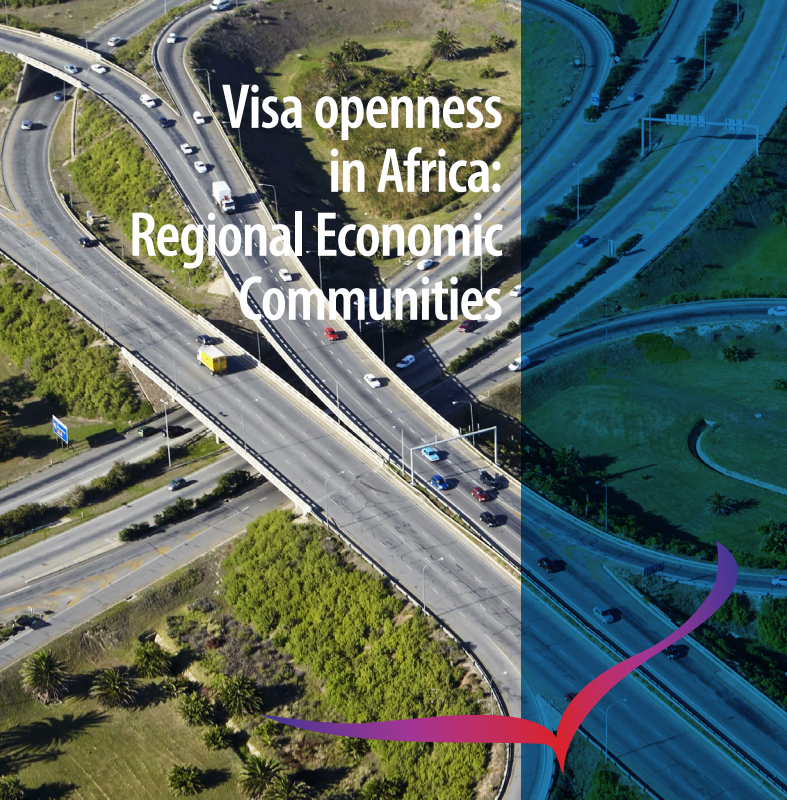Published on 21 November 2024, the ninth edition of the Africa Visa Open Index (AVOI) report reveals that the year 2024 blew mixed winds across the African mobility landscape. While 17 countries have raised their scores, suggesting a more accessible continent, eight have tightened their borders, adding layers of bureaucracy or restrictions.
Data for this year’s edition was collected in July and August 2024. As is the case with all previous editions, the main source of data and information was the International Air Transport Association (IATA).
The results of the report show a slight drop in the overall index, from 0.485 to 0.479, but this cannot mask the structural progress in several regions. Some countries have dared to reform: electronic visas have made headway, making preparations more accessible. Others, on the other hand, have opted for restrictions motivated by security or economic concerns. Conflicts, omnipresent in certain regions, cast a shadow over cross-border movements, reminding us that the aspiration to unity sometimes comes up against complex realities.
2024: A year of change
2024 was a year of change for the AVOI. While 17 countries improved their score, marking significant progress towards greater openness, eight experienced a regression, sometimes due to political decisions or security constraints. Despite these contrasting trends, the overall score for 2024 (0.479) remains comparable to that of 2022 and higher than in previous years, demonstrating a continued commitment to facilitating intra-African travel.
Some nations have distinguished themselves with bold visa reforms, illustrating a desire for regional harmonisation. The introduction of electronic visas in several countries has simplified procedures for travellers, although these new technologies have sometimes made the process more cumbersome for some citizens. In other cases, increased restrictions have hampered progress, with countries such as Burkina Faso, Togo and Chad abolishing the visa on arrival requirement and giving preference to electronic visas.

Top of the rankings
In the vast array of mobility policies, Benin, The Gambia, Rwanda and Seychelles top the rankings, all proudly occupying first place in the Africa Visa Open Index. These pioneering nations offer total visa-free travel to all other African states, a figure which suggests that travel within the continent is still a work in progress.
Behind these leading countries, 16 of the top 20 countries in the ranking are divided between West Africa and East Africa, each with eight representatives. This split reveals the common drive of these regions to open up their borders, despite the challenges that lie ahead. In this ranking, North Africa is discreet, represented only by Mauritania, while Southern Africa has a notable presence with Madagascar, Mauritius and Mozambique.
An intriguing trend emerges: eighteen of these top twenty countries belong to lower-middle or low-income categories. This, the report points out, suggests that low-income countries are often more inclined to adopt liberal visa regimes. Conversely, many high-income countries cling to more restrictive policies, fearing that openness could become a magnet for irregular migration or internal economic competition.
However, it is essential to qualify this: the openness measured by the AVOI relates above all to occasional travel. It does not confer any other rights, such as the right to undertake commercial activities or to elect domicile,’ says the report. This shows that while barriers are falling, they are not all disappearing; partial freedom is being granted, leaving nations to define their own limits.
Furthermore, the report observes, two of the top twenty countries in the index, classified as upper-middle income (Mauritius) and high income (Seychelles), stand out as notable exceptions. Their geographical location as island states, the document points out, plays a decisive role in their policy of openness, as they do not face the same migration dynamics and logistical challenges as countries with land borders, which allows them to adopt distinct visa regimes. Indeed, five of the top 20 AVOI countries belong to this group of islands (Cabo Verde, Comoros, Mauritius, Madagascar and Seychelles), where visa policies vary between full exemption, visa on arrival, or a combination of both.

On the other hand, continental Africa, with its landlocked territories, reveals another facet of openness. Rwanda, Burundi and Ethiopia, despite being landlocked, are among the pioneers of African mobility. Burundi, in a pragmatic approach, offers a visa on arrival for citizens of the majority of African nations, with the exception of those of the six member states of the East African Community (EAC), who benefit from a free entry visa and thus cross the country’s gates without constraint. Ethiopia, for its part, also offers a visa on arrival to 46 African countries, although four nations that used to benefit from a visa on arrival are now required to obtain one before travelling.
Visa-free entry: a shared but still limited ambition
Visa-free entry remains a key indicator of openness. In 2024, 48 out of 54 countries offered visa-free travel to citizens of at least one other African country, with no significant change from the previous year.
Policies also vary according to the degree of openness. For example, 33 countries exempt at least 10 other African nations from visa requirements, and 42 extend this facility to five or more countries. These figures, while encouraging, reveal persistent disparities in the implementation of exemption policies.
Visas on arrival: an evolving alternative
Visas on arrival remain a key option for facilitating travel. However, in 2024, only 27 countries offered this option, compared with 30 the previous year, marking a decline attributable to policy reviews in several nations. Nevertheless, 12 countries stand out as offering a visa on arrival to more than 35 African countries, underlining their commitment to strengthening intra-continental connectivity.
Growing adoption of electronic visas
Digitalisation is gaining ground, with 26 countries now offering the possibility of obtaining an electronic visa, making the process more accessible and fluid. This trend reflects the gradual modernisation of migration policies, although further efforts are needed to standardise and simplify these processes across the continent.
Ranking of African countries in the AVOI 2024
– Benin, Rwanda, Seychelles and Gambia rank first, with a perfect score of 1,000. These countries allow all African citizens to enter without a visa, illustrating their commitment to full mobility on the continent.
– Ghana is in fifth place with a score of 0.868, offering visa-free entry to 26 countries and visa-on-arrival to 25.
– Cape Verde and Nigeria share sixth place, with a score of 0.864, offering a visa on arrival to 36 African countries, while 17 countries do not require a visa to travel to.
– Guinea-Bissau, which offers a visa on arrival for 40 countries and exemption for 13, is in eighth place with a score of 0.849, followed by Mauritania (score of 0.830) in ninth place. Mauritania offers a visa on arrival to 45 countries, while 8 countries are exempt.
– Mauritius is in tenth place with a score of 0.826, offering visa exemption to 27 countries, but requiring a prior visa for five countries and a visa on arrival for 21 countries.
– Burundi is ranked 11th with a score of 0.823. The country offers visa exemption to six African countries and visa on arrival to 47 others.
– Mozambique is in 12th place with a score of 0.815, offering exemption to 12 countries and a visa on arrival for 39.
– Sierra Leone is in 13th place with a score of 0.811, offering exemption to 15 countries and a visa on arrival for 35.
– Comoros and Djibouti share 14th place with a score of 0.800, offering a visa on arrival to all African citizens.
– Senegal is 16th with a score of 0.792, offering an exemption to 22 countries and a visa on arrival to 25.
– Madagascar and Somalia rank 17th with a score of 0.785, exempting 52 countries but requiring a visa on arrival for only one country each.
– Ethiopia is 19th with a score of 0.732, offering visa exemption to two countries and a visa on arrival for 46.
– Tanzania follows in 20th place (0.706), offering exemption to 19 countries, a visa on arrival for 23, but requiring a prior visa for 11.
– Namibia is 21st with a score of 0.653, allowing 13 countries visa-free and offering a visa on arrival for 27, while requiring a visa for 13.
– Malawi and Zimbabwe share 22nd place with a score of 0.472. Each offers exemption to 17 countries and a visa on arrival for 10.
– Zambia is 24th with a score of 0.430, exempting 14 countries and offering a visa on arrival for 11.
– Côte d’Ivoire is 25th (0.415), with 22 countries exempted and 31 requiring a visa in advance.
– Tunisia and Uganda share 26th place with a score of 0.396, exempting 21 countries but requiring a visa for 32.
– Mali is in 28th place with a score of 0.392, exempting 20 countries but requiring a visa for 32, while nationals of only one country benefit from a visa on arrival.
– Guinea and South Africa are 29th with a score of 0.377, offering exemptions to 20 countries but requiring visas for 33.
– Angola is 31st with a score of 0.358, exempting 19 countries and requiring visas for 34.
– Niger ranks 32nd with a score of 0.340, exempting 18 countries and requiring visas from 35.
– Botswana, Burkina Faso and Eswatini rank 33rd with a score of 0.321, each exempting 17 countries and requiring visas for 36.
– Lesotho has a score of 0.302 and ranks 36ᵉ. Nationals of 16 countries are visa-exempt to travel there while those of 37 countries require visas.
– Chad and Togo each have a score of 0.283, together occupying 37ᵉ position, with 15 countries exempt from visa requirements to travel there
– Liberia, with a score of 0.264, ranks 39ᵉ, with 14 visa-exempt countries.
– The Central African Republic has a score of 0.245 and is in 40ᵉ position. African nationals from 40 countries require a visa to travel there, while those from 13 countries are exempt.
– The Republic of Congo has a score of 0.215, occupying 41ᵉ position, with only 5 countries exempt from visa requirements, 8 requiring a visa on arrival and 40 countries requiring a visa for all citizens.
– Gabon has a score of 0.170, occupying the 42ᵉ position. Nationals of 44 African countries must obtain a visa before travelling, while those of countries are exempt.
– Morocco and Sao Tome and Principe, each with a score of 0.151, rank 43ᵉ. These two countries require visas from 45 African countries and only 8 are exempt.
– The Democratic Republic of Congo is in 45ᵉ position with a score of 0.121. Only 4 African countries are visa-free, 3 benefit from the visa-on-arrival regime and nationals of 46 African states require a visa before travelling there
– Algeria, Cameroon and Kenya have an identical score of 0.113, sharing 46ᵉ place. These countries require visas from nationals of 47 African countries, while those of only 6 countries are exempt.
– Egypt is ranked 49ᵉ with a score of 0.106. The country of the pharaohs extends the visa-on-arrival regime to 6 African states, while residents of 46 countries require a visa to travel there.
– South Sudan has a score of 0.087 and occupies 50ᵉ position, with only 3 countries exempt and visa and 2 benefiting from visa on arrival. Residents of the other 48 African countries must obtain a visa before travelling.
– Eritrea has a score of 0.068 and is ranked 51ᵉ, with only 2 countries exempt from visa, 2 others benefiting from visa on arrival and 49 countries subject to visa requirements.
– Equatorial Guinea and Libya have a score of 0.038, together occupying 52ᵉ place. These countries each require a compulsory visa for nationals of 51 African states, while those of just two countries are visa-free.
– Sudan comes last, in 54ᵉ place, with a score of 0.030. Only two countries benefit from a visa on arrival, while the inhabitants of 51 countries must have a visa before any travel.



